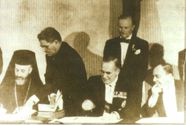|
|
 |
| 1960
Republic of Cyprus |
| Introduction |
|

|
|
British, Turkish-Cypriot and Greek-Cypriot signatories to the 1960 Zurich agreement paving way for an independent Republic of Cyprus
|
The Zürich Agreement (1959)
between Turkey and Greece produced a bi-communal constitutional framework for
Cyprus which recognised the equality of the two `communities' in many important
matters and a large degree of political and cultural separateness.
The President
of the Republic would be a Greek, whereas the Vice-President would be a
Turkish-Cypriot who would have had the right to veto -a potentially disruptive
though crucial way to give effect to political equality. The Turkish-Cypriot
members of the House of Representatives could also in effect veto legislation on
fiscal, electoral, and municipal matters.
Another restriction on unitary
government was the provision of separate communal chambers for religious, and
educational affairs. Makarios did not like the proposed settlement. Before
agreeing to it in London (1960) he consulted personally with Greek-Cypriots, but
he was advised by Greece to accept it. Treaties of alliance and guarantees
provided for the right of intervention by Britain, Greece and Turkey to protect
the constitutional settlement, if necessary, and for the stationing of limited
numbers of Turkish and Greek troops. Britain had her sovereignty over two base
areas recognised, but agreed to extensive rights of movement, administration,
justice, employment, and agriculture for Cypriots. All these important
concessions had, and still have, the effect of making successful and secure
operation of the bases dependent on the Greek-Cypriot goodwill.
|
| |
| Gains
v. Losses? |
|
For the Turkish-Cypriots, a
huge gain from the London agreement was that enosis was prohibited. But then so,
too, partition. There was certainly a good deal of Greek-Cypriot dissatisfaction
with what they regarded as an imposed settlement, though in the late 1959
presidential elections the Greek-Cypriot electorate voted by a two to one
majority for Makarios who, if grudgingly, supported the Constitution, against
his rival, who did not. In Greek-Cypriot eyes a Turkish minority (about one
fifth of the population) had been raised to virtual political equality and
grossly over-represented in the institutions of the state. The new constitution,
it has been aid was in reality the legacy of constitutional strife, rather than
a model for sound government based on democratic lines'.
The new republic took over
sovereignty from the British on August 16, 1960, after eighty-two years of
British rule, much of it troubled. Its occupation had been of doubtful value to
Britain, but had it remained under Turkish control, it might well have become a
battleground during the Turkish war of liberation against the Greeks after the
first world war.
|
|
|
|
|
| References:
|
- From: C.H.
Dodd (ed.), (1993), "The Political, Social, and Economic
Development of Northern Cyprus", Eothen Press,
Huntingdon, Cambridegeshire, England.
|
|
Chronological
History |
|
 |
|









